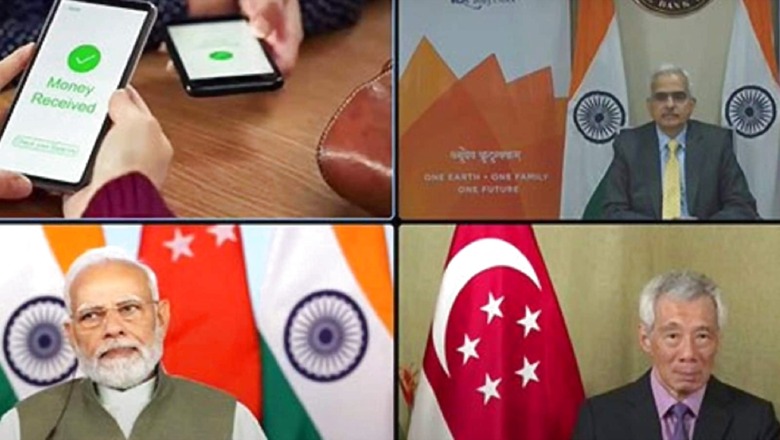
views
Prime Minister Narendra Modi and Singapore’s PM Lee Hsien Loong witnessed the launch of the cross-border link between both countries using their respective fast payment systems, Unified Payments Interface (UPI) and PayNow on Tuesday.
Reserve Bank of India governor Shaktikanta Das and the managing director of the Monetary Authority of Singapore, Ravi Menon, launched the facility on Tuesday through token transactions using the UPI-PayNow connection.
Money transfer
India to Singapore-
- Log into the bank’s mobile application or net banking.
- Go to foreign outward remittance and select the “I agree” option.
- Enter the beneficiary’s mobile number or Virtual Payment Address and proceed to transfer.
- Enter the amount.
- Check the summary and exchange rates.
- Confirm with an OTP or UPI pin based on the app’s requirement.
Singapore to India-
- Log in to PayNow participating members’ mobile application.
- Go to the overseas transfer section.
- Select UPI and enter UPI ID.
- Enter the amount.
- You will see the Singapore dollars equivalent amount on the screen.
- Proceed with the “Transfer Now” option.
All these steps were exhibited during the launch, through a graphic video.
Rina Penkar, Head of Product Development, NPCI International Payments Limited, said: “At NIPL, we aim to facilitate the establishment of new payment infrastructure around the world while enhancing the consumer experience. We are confident that this partnership will play an important role in driving our vision of scaling globally thereby taking India’s digital payment solutions to the world.”
Participating banks
Currently, Axis Bank, DBS Bank India, ICICI Bank, Indian Bank, Indian Overseas Bank, and State Bank of India are accepting remittances through the UPI-PayNow interlinkage in India.
Similarly, ICICI, Indian Bank, Indian Overseas Bank, and SBI are presently enabled for sending remittances through the UPI-PayNow interlinkage
According to the RBI, over time, more banks will be linked to this system.
However, via the UPI-PayNow interlinkage, the following applications and platforms can be utilised to receive and send money remittances from India to Singapore.
Receiving
UPI Handles- @axisbank, @dbs, @icici, @indianbank, @iob and @sbi.
Apps- Axis Pay, DBS Digibank, ICICI iMobile, IndOASIS, BHIM IOB Pay, and BHIM SBI Pay.
Sending
Apps/ Internet Banking- ICICI internet banking, Mobile App (IndOASIS), IOB internet banking, SBI mobile app (BHIM SBI Pay).
Sanjeev Moghe, President and Head of Cards and Payments at Axis Bank, which is one of the participating banks, said: “There is no doubt that this is a milestone moment for cross-border transfers. We all know how UPI revolutionised domestic payments and we are now going to see a similar revolution in the cross-border payments space as well.”
Who can use this
The participating banks’ customers will be able to send money across borders to Singapore by utilising the banks’ internet banking or mobile banking apps. An Indian user can initially send up to Rs 60,000 in a single day (equivalent to around S$1,000).
As per RBI, for the user’s convenience, the system will calculate and show the amount at the moment of the transaction in both currencies.
However, this cross-border service is only allowed for Person to Person (P2P) remittances for the purposes of “Maintenance of Relatives Abroad” and “Gift”, and the transaction can be completed within a minute.
Liberalised remittance scheme
According to the RBI, all residents, including minors, are permitted to freely transfer up to $2,50,000 per financial year (April-March) for any legal current or capital account transaction, or a combination of both, under the liberalised remittance scheme. This means that every transfer that exceeds this amount needs RBI approval.
This enables parents to send money to their children who are enrolled in an international school. Such transactions between residents and their dependents abroad are made possible by authorised dealers, such as banks, who only need a PAN card for identification. However, the LRS is not open to use by corporations, partnership businesses, and charitable trusts.
Upon the launch of UPI-PayNow linkage, RBI clarified that only P2P transfers for “Maintenance of Family Abroad” & “Gift” under the LRS are permitted in the interlinkage transactions, and the LRS restrictions will be applicable.
Read all the Latest India News here


















Comments
0 comment